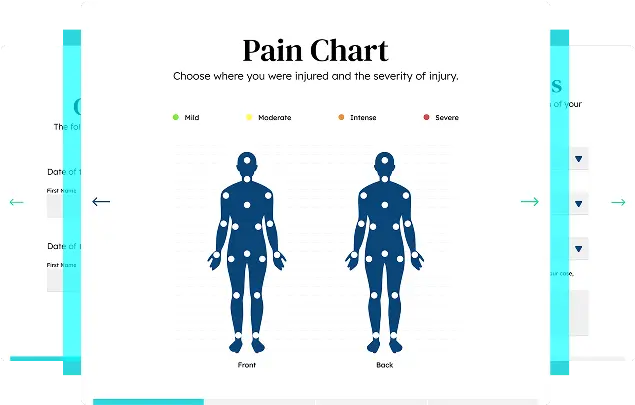Burlington Truck Accident Lawyer
A truck accident can have an incredibly devastating impact on your life. Whether you were a passenger in the truck, a driver in another vehicle, a pedestrian, a motorcyclist, or on a bicycle, you could suffer traumatic injuries. That is why you need to speak with an experienced truck accident lawyer in Burlington from DiBella Law Injury and Accident Lawyers
Get Free Advice About The Compensation You Deserve
Home » Burlington Personal Injury Lawyer » Burlington Truck Accident Lawyer
Reviewed by: Christopher DiBella
April 11, 2025
On This Page
- The Agencies that Govern Trucks in Burlington, Massachusetts
- Negligence and Liability Coverage
- Trucking Regulations
- Proving Your Claim After a Truck Accident in Burlington, Massachusetts
- Do You Need a Burlington Lawyer for a Semi-Truck Collision?
- What Are the Common Causes of Semi-Truck Accidents?
- Common Truck Accident Injuries
- Going the Extra Mile for Crash Victims in Burlington
You deserve to be compensated for your losses after a truck accident in Burlington, Massachusetts. Let the Burlington personal injury lawyer at our firm fight for your right to compensation. We offer free initial consultations for our clients, so be sure to call our office today.
The Agencies that Govern Trucks in Burlington, Massachusetts
Massachusetts regulates commercial motor vehicles (CMV) in accordance with the Federal Motor Carrier Safety Administration (FMCSA) guidelines. The US Congress implemented a Unified Carrier Registration Act, creating uniformity that outlines registration, identification, and insurance standards. Commercial motor vehicles are not considered private passenger vehicles.
CMVs have an overall gross weight of over 10,000 pounds, have five or more wheels, transport hazardous material, or several other factors. The Massachusetts Department of Transportation (MassDOT) handles local enforcement of federal laws that govern the industry. Operation of these vehicles requires a commercial driver’s license.
Trucking companies that fail to hold their drivers to the required standards can also be named as defendants in a claim. While it is the responsibility of the truck driver to follow the guidelines, their employer must also inform them of what is expected. Talk to an experienced truck accident attorney today about your case so we can fight to protect your right to compensation in Burlington, Massachusetts.
Negligence and Liability Coverage
CMVs have tremendous size and weight, making crashes that are involved uniquely dangerous. FMCSA regulates the minimum required for vehicle liability insurance, which currently requires CMV minimum liability coverage of $750,000. There are further additional limitations of coverage for those transporting large volumes of passengers, hazardous materials, and specified types of cargo.
Each state will require vehicles to file a Uniform Motor Carrier Certificate of Insurance with the individual state authority. If you are injured in a truck accident, it is imperative that you talk to a Burlington truck accident attorney immediately. The longer you wait, the higher the risk is that you might not recover compensation.
An attorney will be able to review your case and determine who was negligent in the truck accident. Identifying how many possible defendants can be named will help determine the amount of compensation you might receive. Call us today to schedule a free consultation with a member of our personal injury team in Burlington.
Trucking Regulations
Every single person who wants to drive a commercial vehicle is required to meet certain milestones. Those milestones are enforced at the local, state, and federal levels. Those with a commercial driver’s license must meet a rigid set of requirements and knowledge, which include:
- Must be 21 years of age (18 for intrastate).
- Fit and able to safely handle vehicle cargo.
- Successfully passed a driver’s road test.
- Pass an industry-specific medical examination, which is renewed every two years.
- Complete a knowledge and safety test exam with an 80% threshold for passage.
Number of Service Hours Regulation
The law has a set of regulations that apply to the number of hours a driver may operate a commercial motor vehicle. These hours-of-service regulations must be followed by all drivers, or else they can face serious penalties. These laws are designed to limit the possibility that excessively fatigued drivers are using the vehicles as follows:
- 11 and 14-Hour Limits: Generally, these are associated with “daily” limits. A driver may drive for a maximum of 11 hours within a window of time of 14 hours.
- 7 Day/60 Hours and 8 Day/70 Hour Limits: Commonly known as “weekly” limits for driving. Those drivers based on seven or eight-day work schedules must not exceed 60 or 70-hour work limits, respectively. When “restarting” a new weekly hour cycle, the driver must have 34 consecutive hours off from work.
The Department of Public Safety and the state-assigned enforcement entities may investigate CMV accidents. In addition, they may request insurance verification, as well as inspections of records, facilities, and vehicles as needed. Talk to our truck accident attorney in Burlington today about your case.
We’ve offered crucial support and guidance to individuals who have suffered injuries, ensuring their financial and emotional well-being.
Proving Your Claim After a Truck Accident in Burlington, Massachusetts
The driver hour restrictions require that all driving activity is tracked or logged. Traditionally, each driver maintained their own “log book” to track and calculate their activity. To allow for greater transparency and accuracy of this data, a federal plan is being implemented to have all such data managed in an electronic format.
Electronic log device (ELD) implementation is expected to create a safer working environment and track records of duty status (RODS). Those currently using a manual documentation system must transition to an ELD by a December 2017 deadline. Individuals using another form of onboard recording device must convert to full ELD tracking by a December 2019 deadline.
With the drafting of the new regulation, development by makers of ELD is further evolving. Many ELD systems can be used with a smartphone or other handheld device. Most current systems are portable yet able to be mounted within a fixed point that a driver can see while operating.
Storing the Reporting Data
The reporting data generated by the systems must be stored for six months. Some commercial vehicles have what is loosely referred to as “black-box” devices installed. These recorders, more commonly associated with aircraft, are usually capable of documenting GPS location and vehicle speed information.
The transition to electronics is likely to encounter some initial difficulties with compatibility and other technical concerns. However, ultimately, it will serve to better contribute to the overall safety of CMV operation. Talk to our personal injury lawyer for an honest assessment of your case after a truck accident in Burlington, MA.
Get immediate case evaluation with no cost or obligation to you in less than 5 minutes.

Do You Need a Burlington Lawyer for a Semi-Truck Collision?
The size of semi-trucks means that even a relatively minor act of negligence on the part of a truck driver can lead to severe accidents and life-changing injuries for the victim. Commercial truck accidents, including jackknife, runaway trailer, and underride accidents. These accidents often result in brain injuries, spinal cord injuries, loss of limbs, and in extreme cases, wrongful death.
From our location in Burlington, our team at DiBella Law Injury and Accident Lawyers has built a reputation and a record for our success in representing victims of commercial truck collisions. We understand that filing a lawsuit may seem like the last thing on your mind after an accident. It is essential that you take legal action as quickly as possible.
Medical expenses and vehicle damage aren’t the only concerns of truck accident victims. Permanent injury, lost income, and an incapacity for future work can cast a long shadow over the lives of victims and their families. Our goal is to thoroughly review your circumstances and pursue the compensation that you need and may be entitled to. No Fee Until We Win.
What Are the Common Causes of Semi-Truck Accidents?
In most cases, commercial truck drivers and their employers provide an invaluable service by transporting our goods while obeying the rules of the road and respecting other motorists’ rights to safety. However, there are specific rules that truck drivers must follow to do their job correctly, and when they fail to do so, it can lead to severe accidents. A competent Burlington truck accident lawyer needs to be able to dig deep to learn about the cause of the collision.
We have the experience not only to do this but also to illuminate these causes in court. We will work to hold negligent parties and their insurers accountable for avoidable mistakes. Common causes of truck accidents include:
- Driver fatigue
- Speeding
- Improper lane change
- Poor vehicle maintenance
Common Truck Accident Injuries
As you might imagine, a truck accident can leave you with devastating injuries if you are lucky enough to survive. These injuries can change your life in an instant, making it nearly impossible to return to work, pay your bills, and provide for your family. Once you seek medical care, it is important to talk to a lawyer about those injuries as soon as possible.
Be sure to follow all of the doctor’s orders, take your prescriptions until they are finished, and do not skip any scheduled appointments. Doing so can ensure that your case moves forward successfully. Talk to our team today to schedule a free consultation if you have suffered any of the following truck accident injuries:
- Broken bones
- Burns
- Internal bleeding
- Organ damage
- Amputation
- Spinal cord damage
- Paralysis
- Traumatic brain injury
Going the Extra Mile for Crash Victims in Burlington
To better prove accident claims in court and to stubborn insurance companies, our Burlington truck accident lawyer utilizes all the resources available, including experts in accident reconstruction, photographers, and actuaries. Our established network of contacts helps us get the best outcomes. Please call us today to schedule a free consultation with a Burlington truck accident attorney.
